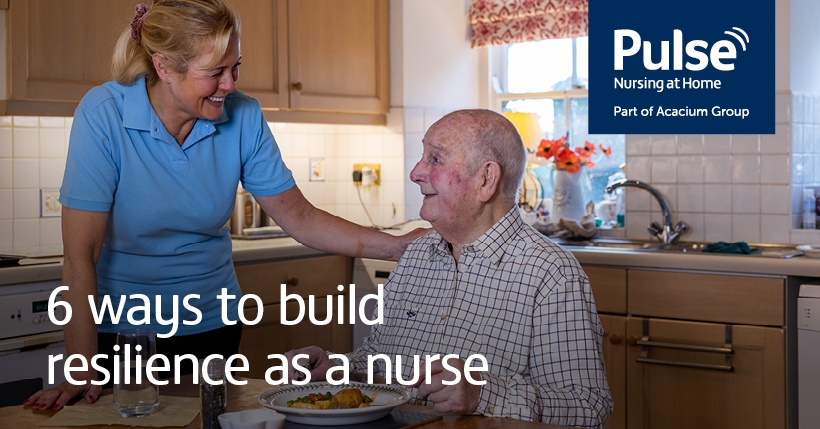
Resilience in nursing is a core skill community nurses will obtain and develop during their careers. Being resilient enables nurses to manage difficult situations successfully and adapt to changing circumstances without letting their emotions be affected.
Our Supervision and Appraisal Lead and registered nurse, Sara, shares her top tips on building resilience.
What is resilience?
Resilience is the ability to process and adapt quickly to difficult situations. An example of resilience is when someone has quickly bounced back after a challenging experience, managed their emotions throughout and remained positive.
What is resilience in nursing?
Resilience in nursing can result in improved quality of care and outcomes for clients and staff. Resilient nurses naturally encourage positivity, enthusiasm and strong communication skills.
Resilience is a key skill to continuously develop during your nursing career. Learn more about the importance of building resilience and prioritising self-care on the Royal College of Nursing’s library.
How to build resilience in nursing
Building resilience in nursing is an important trait to possess to support your development. There are many ways to build resilience in nursing, such as good time management, developing communication skills and maintaining a positive attitude during your shifts.
Let’s take a look at the top 6 tips I’ve learned for building resilience in nursing.
1. Celebrate your strengths
Working as a nurse, you will know how diverse and reactive the role can be, whether you’re working as a community nurse or hospital nurse. It’s important to take a moment for reflection at the end of each shift to celebrate your strengths, both big and small. Either on your commute home using public transport or once you’ve arrived home, spend a few minutes making notes in a diary or your phone of 3 things you achieved during your shift.
Remember to look back at all these achievements when you need to take a moment and pause during a difficult or challenging time.
2. Prioritise your wellbeing
Incorporate self-care into your routine. Nurses are very compassionate and dedicated individuals who put the needs of their clients first and can sometimes forget to take a moment to prioritise their wellbeing. After your shift or during your days off, do something that makes you feel good such as taking a walk, cooking your favourite meal or spending time with loved ones.
Another great way to prioritise your wellbeing is practising mindfulness which is a form of meditation where you focus on becoming more aware of your senses and surrounding environment. Learn more about practising mindfulness and its many benefits in our guide.
3. Build your emotional intelligence
Emotional intelligence (EI) is being able to manage your emotions and understand and analyse the emotions of others. EI involves recognising how people are feeling and how everyone’s emotions can have positive and negative impacts on others. Here are a few tips to try to help build your emotional intelligence:
- Accountability
Holding yourself accountable is an important part of being emotionally intelligent. Whenever you make mistakes acknowledge your errors, but also look at how to improve for next time, to further develop your skills and become a professional and resilient nurse.
- Keep a diary or journal
An easy way to recognise and understand emotions, including your own, is to write them down. Whenever you experience strong emotions during a situation, write down what has happened, how you felt and how you think others felt around you. Noting these situations can allow you to reflect and think about what you can do differently next time to achieve a positive outcome.
- Put yourself in someone else’s shoes
Changing your point of view is an important element of emotional intelligence and shows you can consider others’ feelings and use your emotions to recognise the thoughts and feelings of those around you. When in a challenging situation, take a moment to think about how the other person is feeling about the challenge and consider how they would manage it.
4. Be flexible
To maintain consistency in a client's care, you need to be adaptable to meet their changing health needs. There will be times when you may have to work with other healthcare professionals, manage challenging situations or quickly react to a decline in the client's health. It is key to welcome these challenges and remain flexible to ensure the client remains stable and well.
5. Identify and manage your stressors
Identifying and managing your stressors shows high levels of emotional intelligence and resilience. It’s important to manage your stress so it doesn’t impact your clients and, most importantly yourself. A few ways to manage your stressors are to ensure you’re getting enough sleep, eating healthy and regularly and taking time for yourself.
For more guidance on managing and reducing stress, read the Royal College of Nursing’s guide.
6. Be authentic
Authentic nurses are more likely to feel like they are making a real difference. Authentic people will naturally instil trust in others. In nursing, being authentic is an important characteristic to display to encourage your clients to feel more comfortable and calmer under your care.
Community nursing roles with Pulse Nursing at Home
We’re always looking to grow our team of compassionate adult nurses and paediatric nurses at Pulse Nursing at Home. If you would like to join our team of healthcare professionals, then register with us using the form below, or contact our team on 0333 323 3746 or joinus@pulsenursingathome.co.uk.
The information in this blog post is for general informational purposes only and not a substitute for professional medical advice. Always consult a qualified healthcare provider for personalised guidance. The author(s) and publisher(s) are not liable for errors or omissions, and reliance on the content is at your own risk.